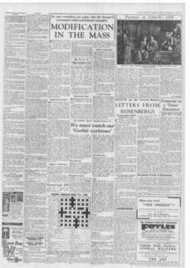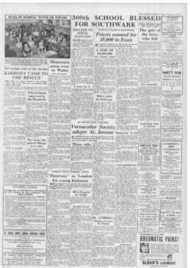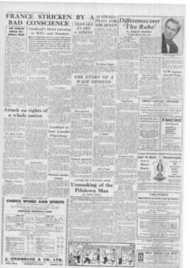Page 4, 27th November 1953
Page 4

Report an error
Noticed an error on this page?If you've noticed an error in this article please click here to report it.
Tags
Share
Related articles
The Laity And The General Council
Tito's Word War Fans Old Fears
The Separated Communions
Catholics
A Common Christian Stand
TRUTH ON TRIESTE
THOSE who deeply value the relations between this country and Italy---and they surely include in a special way the Catholics of this country-must have followed the newspaper accounts of the recent troubles in Trieste, together with the subsequent anger in Italy. with much sorrow.
Happily, our worst fears. both with regard to Anglo-Italian relations and to dispute over the disputed zones, have not been realised. and the latest contribution of the Italian Government is moderate and constructive. Even if no solution, satisfactory to the contending parties can be devised, it remains of the first importance that the interested parties should remember that those who stand to gain in the long run from acrimonious disputes and aroused nationalistic feelings are the enemies of all world peace and justice.
T TNFORTUNATELY there has been a disposition in this country to suppose that Italy had no excuse for its anger about the troubles in Trieste itself and that Britain and America were in no way to blame in regard to the mode in which their thankless duty of keeping the peace under difficult conditions was carried out. As in fact the newspaper accounts have given a very partisan view of the events, this reaction has been natural enough.
Information now reaching this paper from Italy-both from Italian sources and English sources in Italy-strongly suggests that foolish and grave mistakes were made by the police in Trieste. while the British Government has failed to make the gestures that could have done much to calm Italian feelings.
The original incident about the Italian flag, though deeply resented by the Italians, may well have been justified in terms of strict impartiality.
What followed next day was a different matter. Students decided to strike in protest, and, no doubt, their attitude was encouraged by the anti-British Fascist minority, the M.S.I., sent from Italy.
The state of mind of the Allied Command police in dealing with a disorder which has not been shown to be intrinsically serious, was demonstrated by what happened in the Piazza S. Antonio and the church standing on it. There the cornered students, having already been attacked with heavy truncheons, took refuge in the church. The police followed them into the church, right up to the High Altar, and then dampened their spirits by hosing them with water.
This breach of "sanctuary" would hardly be countenanced in this country. In a Latin and Catholic country it is still considered sacrilege. Indeed, the church had to be reconsecrated by the Bishop.
As to this blunder, no apology or explanation has been forthcoming from the Allied Military Government or the British and American Governments. An apology would have done much to allay Italian feelings.
Worse was to come, for at the service of reconsecration, the police, ordered to fire into the air to disperse the crowds, shot two
people a boy of 16 and a man of 6I-and injured others. The crowd was again attacked when it sought to leave the church into which it had entered to find refuge.
Next day, the police were wisely confined to barracks, except in front of the Governor's palace. Their presence there angered the crowds which threw stones, and once again the order to fire was given. Later two bombs were thrown from the square which exploded harmlessly, and once again the police fired. The day's casualties were six dead and many wounded.
The subsequent retirement of the police, even though well over a hundred thousand attended the funeral of the victims, resulted in complete peace and order in Trieste.
WAS it surprising that this sequence of tragic events, the necessity for which was far from obvious, should fill patriotic Italian hearts with genuine indignation and sorrow? Was it surprising that both neo-Fascists and Communists should exploit this sorrow to arouse anti-British feelings throughout the country? Was it surprising that Italian Government spokesmen should feel obliged to give public and official expression to these feelings?
Yet one knows that mistakes of this kind are always possible in delicate situations where nerves are frayed and miscalculations of local feelings are easy.
The most important point that seems to emerge is that the majority of the Italians themselves were hardly less pained by the arousing of anti-British feeling in the country than by the events which inevitably caused it.
Had highly placed British and American spokesmen expressed regret for the incidents, or had they even expressed some commiseration with the fate of the victims and their families and at least apologised for the desecration of S. Antonio. the sorry story might in fact have strengthened rather than weakened understanding between the Italians and their allies. Even some expression of warmth and sympathy from the British and American Press would have greatly helped.
This is shown by the fact that the strong, but yet worm and understanding, words of Sir Winston Churchill. have been seized almost everywhere in Italy almost with gratitude because contempt and coldness were absent from what he said. He sounded human. He showed friendliness.
Friendship between Italy and this country is vital, and it is therefore difficult to understand the absence of any lead from the Government to dissipate misunderstanding in a situation like this. Nor has our Press, on which the country depends for a truthful account of events, done its part to enable our people to express to the people of Italy the feelings they would certainly have if they understood the real circumstances of the tragedy.
blog comments powered by Disqus









